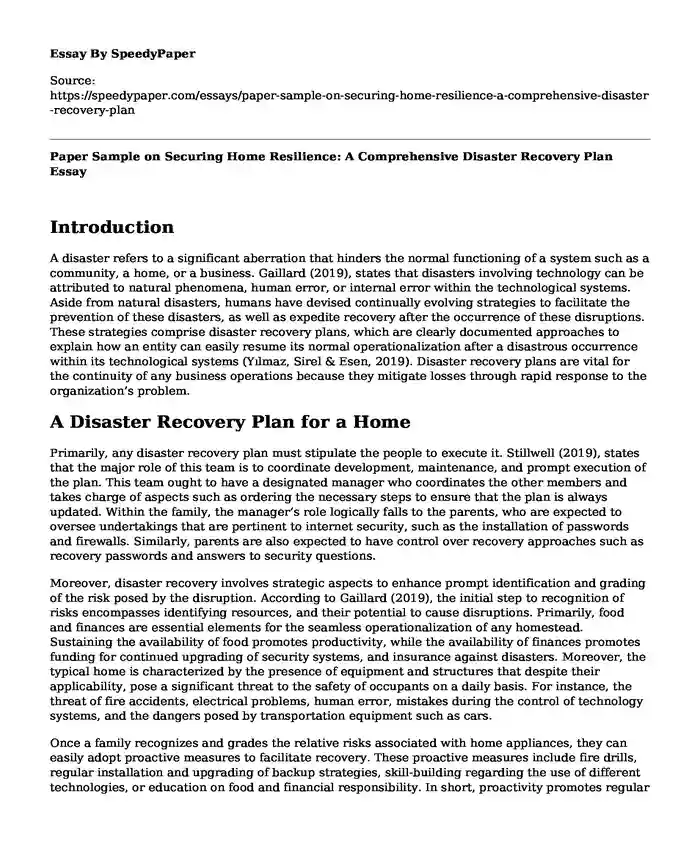
| Type of paper: | Essay |
| Categories: | Technology Security Disaster |
| Pages: | 3 |
| Wordcount: | 606 words |
Introduction
A disaster refers to a significant aberration that hinders the normal functioning of a system such as a community, a home, or a business. Gaillard (2019), states that disasters involving technology can be attributed to natural phenomena, human error, or internal error within the technological systems. Aside from natural disasters, humans have devised continually evolving strategies to facilitate the prevention of these disasters, as well as expedite recovery after the occurrence of these disruptions. These strategies comprise disaster recovery plans, which are clearly documented approaches to explain how an entity can easily resume its normal operationalization after a disastrous occurrence within its technological systems (Yilmaz, Sirel & Esen, 2019). Disaster recovery plans are vital for the continuity of any business operations because they mitigate losses through rapid response to the organization’s problem.
A Disaster Recovery Plan for a Home
Primarily, any disaster recovery plan must stipulate the people to execute it. Stillwell (2019), states that the major role of this team is to coordinate development, maintenance, and prompt execution of the plan. This team ought to have a designated manager who coordinates the other members and takes charge of aspects such as ordering the necessary steps to ensure that the plan is always updated. Within the family, the manager’s role logically falls to the parents, who are expected to oversee undertakings that are pertinent to internet security, such as the installation of passwords and firewalls. Similarly, parents are also expected to have control over recovery approaches such as recovery passwords and answers to security questions.
Moreover, disaster recovery involves strategic aspects to enhance prompt identification and grading of the risk posed by the disruption. According to Gaillard (2019), the initial step to recognition of risks encompasses identifying resources, and their potential to cause disruptions. Primarily, food and finances are essential elements for the seamless operationalization of any homestead. Sustaining the availability of food promotes productivity, while the availability of finances promotes funding for continued upgrading of security systems, and insurance against disasters. Moreover, the typical home is characterized by the presence of equipment and structures that despite their applicability, pose a significant threat to the safety of occupants on a daily basis. For instance, the threat of fire accidents, electrical problems, human error, mistakes during the control of technology systems, and the dangers posed by transportation equipment such as cars.
Once a family recognizes and grades the relative risks associated with home appliances, they can easily adopt proactive measures to facilitate recovery. These proactive measures include fire drills, regular installation and upgrading of backup strategies, skill-building regarding the use of different technologies, or education on food and financial responsibility. In short, proactivity promotes regular testing and maintenance undertakings on the existing security systems, hence improving the capacity to stay abreast of the evolving dangers.
Steps to Restore Normal Operations after a Disaster
Prompt institution of the laid down procedure for insurance claims for disasters involving destruction or loss of property.
Retrieval of backed-up data immediately after the imminent danger has been resolved. Retrieval of data will help to augment the claim process and provide the necessary information to facilitate other recovery strategies.
Early commencement of repairs and reconstruction of the damaged properties can be salvaged by adhering to a strategically pre-established procedure.
References
Gaillard, J. C. (2019). Disaster studies inside out. Disasters, 43, S7-S17.
Stillwell, K. (2019).Two Overlooked Factors in Disaster Recovery. Risk Management, 66(6), 10-11.
Yilmaz, H. E., Sirel, A.,& Esen, M. F. (2019).The impact of internet of things self-security on daily business and business continuity.In Handbook of research on cloud computing and big data applications in IoT (pp.481-498).IGI Global.
Cite this page
Paper Sample on Securing Home Resilience: A Comprehensive Disaster Recovery Plan. (2023, Dec 26). Retrieved from https://speedypaper.com/essays/paper-sample-on-securing-home-resilience-a-comprehensive-disaster-recovery-plan
Request Removal
If you are the original author of this essay and no longer wish to have it published on the SpeedyPaper website, please click below to request its removal:
- Free Essay on Teens and Technology: Texting and Driving Issue
- Essay Example on Network Management
- Homeland Security Improvement, Free Essay for Everyone
- Essay Sample on Case Analysis of Risk, Uncertainty, and Managing Incentives
- Free Essay: Social Media Contributors to Fake News and Troll Armies
- Community Voluntary Disaster Organization - Essay Sample
- The Benefits of Artificial Intelligence(AI) for Business Management - Essay Sample
Popular categories




